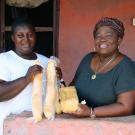This handout focuses on updates for the project "Sustainable Technology for Orange and Purple Sweetpotato (STOPS) in Ghana". The principal investigator on this project is Eunice Bonsi, Tuskegee University. The handout is supplemented by an additional poster that provides a project overview, rationale, objectives, survey goals, methodologies, perceptions of relative nutrient benefits, and sources of vines.
From the handout:
Disease-free orange and purple sweet potato vine multiplication improves production and processing capacity
In Ghana, Savannah Agricultural Research Institute (SARI) scientists finished a demonstration plot at their experiment station, as part of an effort to improve production of disease-free planting materials for high-value orange and purple sweet potato crops and enhance the capacity of local farmers in Tamale and Bawku.
To meet this objective, the Sustainable Technology for Orange and Purple Sweetpotatoes project, supported by the Horticulture Innovation Lab with funding from the United States Agency for International Development (USAID), provided clean orange and purple sweet potato planting materials and helped plant the plot for multiplication of the clean vines at SARI. These clean vines will be distributed to selected farmers who will multiply and produce large numbers of disease-free sweet potato plants. These plants will then be made available to approximately 100 farmers in the Northern and Upper East regions on a large scale at low cost.
The project trains farmers, processors, women organizations and school children in sweet potato farming and gardening, harvesting, storage and consumption. Several products such as flour, puree, bread and complementary foods have been developed from the orange and purple sweet potatoes for nutritional benefits. This increases the collaboration between public and private sectors for employment and reduces vitamin A and iron deficiencies in women and children. STOPS’s support increases SARI’s capacity to disseminate sweet potato production techniques and consumption through promotion and marketing of programs to students, farmers and small businesses interested in establishing enterprises through the utilization of orange and purple sweet potato crops.
This poster and handout were part of the Round 2 Project Updates Q & A panel at the Horticulture Innovation Lab 2014 Annual Meeting, which took place March 17-21, 2014 in Hotel Real Intercontinental, Tegucigalpa, Honduras.

